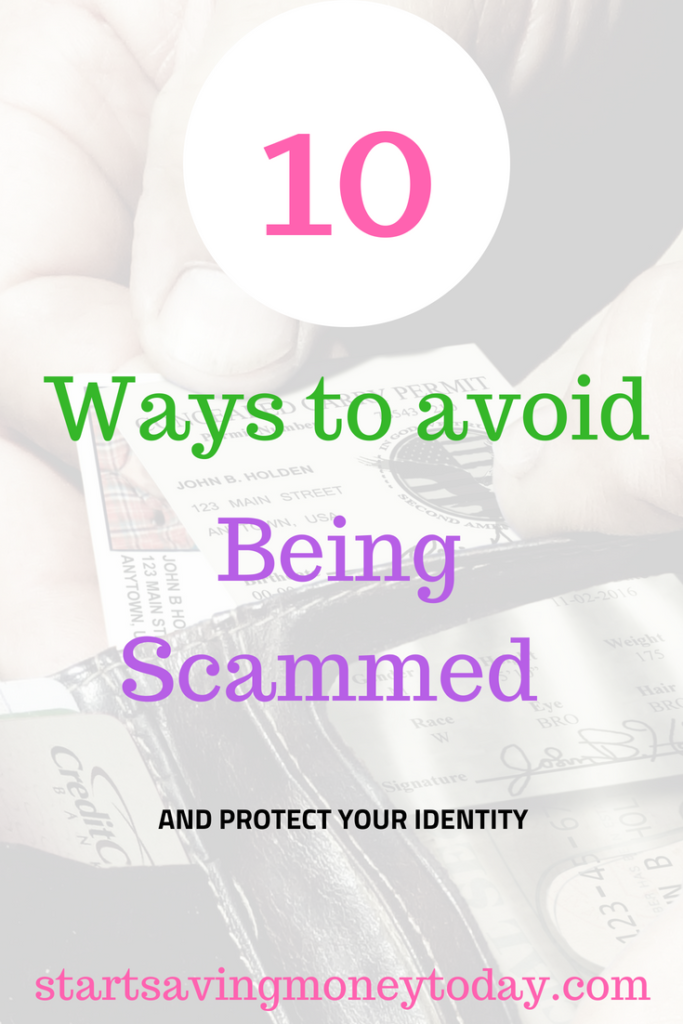How to avoid scams
It’s amazing how many scams are going on at any given time. There’s always someone looking to cheat you out of your money. This is blog about frugal living saving money earning extra money and budgets and spending journals. I’m all about using money wisely, so it makes sense to talk about protecting it. There are con artists looking for a way to take unfair advantage of you, to cheat you out of your money. I want you be aware and wary of ploys to con you and to know that it’s fairly simple to avoid scams. I want to show you how to avoid scams.
I speak from experience
A few weeks ago, I was working on my blog, and I received a phone call. I didn’t recognize the number, so I didn’t pickup. I figured, if it was important, they’d leave a message.
Well, they did leave a message. It went something like this: I’m calling on behalf of the Internal Revenue Service. Your account has been reviewed by the IRS, errors in your returns have been found and you owe a significant amount of money in back taxes, penalties, and fines. You need to take action before it’s too late as they will be forced to take legal action against you. You could be arrested as early as tomorrow. It is urgent that you contact me immediately at (xxx) xxx-xxxx to make an initial payment and make arrangements for full payment.
That message was very disturbing. Some people try to cheat a little here and there, tell little white lies, and get away with something they shouldn’t. I believe those things will catch up with you eventually, and it usually doesn’t work out so well. On top of that, we’re talking about the IRS! Who wants to be in trouble with them? Not me! I’m meticulous when it comes to my taxes. I couldn’t imagine how I could be in trouble with those people. But. If I was, then I needed to do something quickly.
How I avoided this scam
I thought about calling the number left in the message and decided against it. Over the years, I’d heard about scammers who sound legit, but anybody can say anything. If I was going to deal with an IRS agent, I wanted to verify (1) their identity and (2) the problem they claimed I had. Instead of calling the number in the message, I called the local IRS office. I felt like they could give me an answer as to what was going on with my account and (hopefully) tell me what to do to resolve the problem.
I explained the call and message to the agent that answered my call. The agent quickly told that the IRS does its own collections and that contact is initiated with a letter, not a telephone call. I was also told to report the fraudulent call to the local police (which I did). To set my mind at ease, the agent looked up my account, and told me there were no “red flags” or indications of a problem.
What could’ve been
I don’t know what would have happened if I’d returned that phone call, but I’m positive doing so would have been the wrong thing to do. I can only imagine the questions that would’ve been asked: What is your social security number, date of birth, local address? Whoever answered my call would have been after anything a scammer would think is important. If nothing else, I’m sure they would have set me up to steal my identity.
Hint: Just because someone says they need information doesn’t mean they do. Keep personal things personal!!! Most con artists are experts at the art of interviewing. They know how to get answers to their questions.
What else
Because I didn’t return that phone call, I’ll never know for sure what all the repercussions could have been. There is no doubt in my mind that the caller was scammer after money or information at a minimum. We need to beware and be aware. The IRS scam is not the only one out there, and they all have a number of variations.
Scammers are ripoff artists and they will contact you by phone, email, or letter. Occasionally, they will encounter you in person. The last one is a favorite of “fix it” scammers. These are people who appear to be contractors. They approach you about something (real or imagined) that needs to be done to your house or other property. They say they can make the repair but need you to provide cash to buy the materials for the job. The amount they require will be significant, but reasonable for the job—seemingly, a good deal for you. Once they have your money, they go to pick up supplies…and never come back. Or, if they do their work is shoddy, perhaps even damaging, and once they’re done, they’re gone and so is your money. (Some really bold ones will contact you again with an estimate about how much they’ll charge you to fix the damage they did.)
Scammers will contact you
Regardless of how scammers contact you, they will appeal to your emotions, your needs, greed, sympathy, sense of justice…anything to make you feel you have a critical situation to deal with. It may be presented as a problem you have or as something you can do for a stranger in dire straits. (I’m thinking of one scam in which people are convinced to wire money overseas to provide a life-saving operation. If you fall for this once, you’ll be contacted again, and again, and again for additional funds to cover “complications.”) Whatever cover story is used, a scammer’s goal is to take as much of your money as he can.
As a frugal person or at least a person that cares about your money it’s your job and responsibility to avoid scams.
You don’t have to be a victim
10 ways to avoid scams:
1. Unless you know for sure who you’re talking to and why they need it, never give out personal information over the phone. Even then, make sure they really need it. (Ask what happens if you don’t give it to them.)
2. Never send money to someone you don’t know personally.
3. Don’t click on attachments and links you didn’t request.
4. Scammers are good at forging documents, seals, and letterheads. Confirm who you are doing business with. Don’t just take their word for it. Look up the public number for the business, corporation, institution, etc. Call “headquarters” and ask for verification that the person who contacted you is, indeed, their representative.
5. Buy online only when the website has a secure URL. It will read “https.” The “s” is very important. Also, the address bar will include a small lock icon. This means the URL is secure. As for me, if it’s a company I’m not familiar with I go to the bbb.org to read the reviews. I also check other review sites.
6. Many scammers use social media to find victims. I’ve heard about people falling in love with someone they meet on Facebook or Twitter. They become captivated with stories or pictures (both fake). They respond to requests for money and personal information. Later, they’re heartbroken and financially devastated. Keep your personal information personal.
7. I’m sure you’ve heard this a million times…there’s information you need to keep private—like banking information, credit cards, date of birth, social security number. Always ask: Why do you need this information? Then wait for a real answer. “It’s just procedure” isn’t a real answer. Keep pushing until you get something satisfactory, or hang up and call the institution the caller represents. Request to speak to someone who can give you an answer.
8. Nothing has to be done right now. Don’t allow anyone to push you in to doing anything right now—especially if it is a first contact. Everything can wait. Everything can be verified by another representative.
9. If you have a financial problem that is resolved by payment(s), there may come a time in the future when you will need to prove you did pay. Payments made with cash, wire transfers, and gift cards can’t be traced; you will not be able to prove you paid. Use more conventional payment methods like credit cards, checks, or money orders—and keep payment verification.
10. Never give out personal information on social media. Imposters, con artist, and scammers know how to collect personal information about you, your family, and your friends.
Bonus tip
It’s your money. It’s your responsibility to avoid scams and to protect yourself.
Avoid the scam keep your personal information to yourself.
Conclusion
It’s a given: There are people who think scamming is the best (translate that to “easiest”) way to make money. They come up with creative ways to take yours, but there are some fairly simple ways for you to avoid scams and defend yourself against their attacks. One is verifying that the identity and claims of people who contact you are legitimate. Keeping you personal information private, and using secure means of payment are among others. Protecting what is yours is a frugal principle.
Never miss another post like me on Facebook


